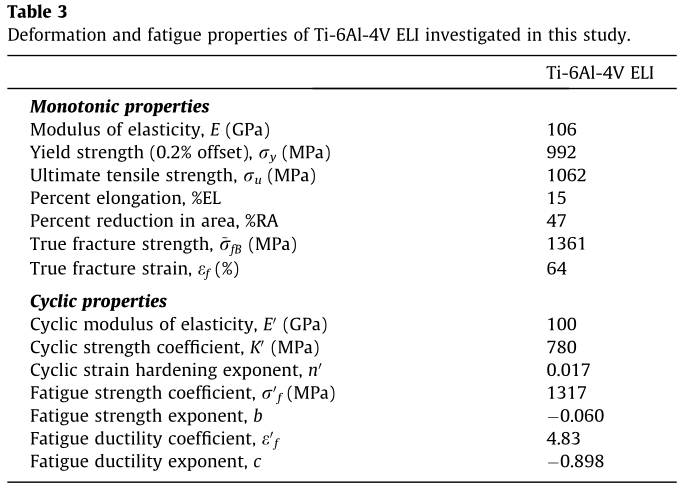TAGGED: fatigue, mechanical
-
-
October 5, 2020 at 9:45 pm
ArthurSA
SubscriberHello everyone,n nI’m experiencing a problem with Fatigue Module and need help understanding if I’m doing something wrong or if it’s a software bug. Let me explain.nI’m simulating the strain-based fatigue life of a Ti6Al4v part. The material properties were taken from the paper “Fatigue behavior of Ti-6Al-4V ELI including mean stress effects (Patricio E. Carrion et al, 2017)” as seen on the picture.n n nThe problem lies in the value of the Cyclic strain hardening exponent (n’) being 0.017. I performed a series of tests and Ansys does not seem to accept values below 0.03 regardless of other material properties or the case being studied, always resulting in the generic “An error occurred inside the FATIGUE module.”nI initially thought it was a problem with the value reported in the article, but the “A study of fatigue notch sensibility on titanium alloy TiAl6V4 parts manufactured by selective laser melting (L.P. Borrego, 2018)” finds similar results, as seen on the picture.n n
nThe problem lies in the value of the Cyclic strain hardening exponent (n’) being 0.017. I performed a series of tests and Ansys does not seem to accept values below 0.03 regardless of other material properties or the case being studied, always resulting in the generic “An error occurred inside the FATIGUE module.”nI initially thought it was a problem with the value reported in the article, but the “A study of fatigue notch sensibility on titanium alloy TiAl6V4 parts manufactured by selective laser melting (L.P. Borrego, 2018)” finds similar results, as seen on the picture.n n nIn order to verify if the problem is solvable, I used the calculator found on efatigue.com which gives the same results as Ansys Fatigue Module for the problem with n’>0.03 and can solve the problem for n’<0.03 were fatigue Module can’t. n nSo, is this a bug on Ansys or I’m missing something? Can anybody replicate this error for a generic problem and material with n<0.03?n
nIn order to verify if the problem is solvable, I used the calculator found on efatigue.com which gives the same results as Ansys Fatigue Module for the problem with n’>0.03 and can solve the problem for n’<0.03 were fatigue Module can’t. n nSo, is this a bug on Ansys or I’m missing something? Can anybody replicate this error for a generic problem and material with n<0.03?n
-
October 6, 2020 at 7:24 pm
danielshaw
Ansys EmployeeA small cyclic strain hardening exponent will produce an elastic-nearly perfectly plastic cyclic stress-stress curve. The Mechanical Fatigue Tool (FT) fits a curve to the non-linear stress-strain curve. The algorithm FT may not be able to accurately resolve the sharp knee in an elastic-nearly perfectly plastic stress-strain curve. A poor curve fit can cause solver failure.nCyclic strain hardening exponents less than 0.03 have been known to produce poor fits and resulting solver errors. To eliminate the solver errors, you probably need to increase the cyclic strain hardening exponent (maybe up to a value of about 0.1). The Neuber correction used by the FT is only valid for stresses slightly above yield with a small plastic zone constrained by surrounding elastic material. For these types of strain distributions, the value of the cyclic strain hardening exponent should not significantly affect the calculated fatigue results.n -
October 6, 2020 at 7:34 pm
ArthurSA
SubscriberHi Daniel, I am very grateful for your answer!nI believe that the points you raised may be the difficulties encountered by the software.nThank you!n -
October 7, 2020 at 2:09 pm
danielshaw
Ansys Employeeyou're welcome. sorry for the double posting. must have been a computer glitch.n
-
Viewing 3 reply threads
- The topic ‘Need help understanding an error in Fatigue Module’ is closed to new replies.
Ansys Innovation Space


Trending discussions


Top Contributors


-
3827
-
1389
-
1188
-
1100
-
1015
Top Rated Tags


© 2025 Copyright ANSYS, Inc. All rights reserved.
Ansys does not support the usage of unauthorized Ansys software. Please visit www.ansys.com to obtain an official distribution.







